Problem-based learning (PBL) gives students opportunities for collaborative as well as self-directed learning. The school of applied science at the Republic Polytechnic in Singapore uses one problem a day to teach general chemistry to a wide ability cohort of post-18-year old students.
-
Problem-based learning encourages students to take responsibility for their own learning
In a knowledge-based economy, it is vital for our graduates to be self-regulated learners, able to learn on their own and to evaluate vast amounts of information to solve problems and make decisions. They also need to develop interpersonal skills and professional attitudes, such as being able to work well in teams, communicate effectively, criticise constructively and uphold ethical behaviour.1-3
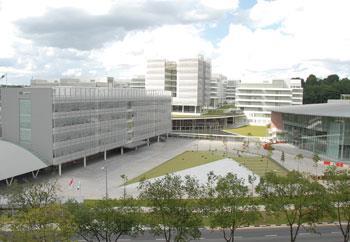
Such education outcomes require an active learning approach that gives students the opportunity to work on problems, similar to what they are likely to face in their future careers. We believe that problem-based learning (PBL) can provide a structured framework of active and collaborative learning that is in-line with these outcomes.4
PBL in chemistry
Problem-based learning in chemistry is not new and has been used in many universities around the world. For example, Simon Belt and his colleagues at the University of Plymouth, UK,5,6 has used PBL with a group of students with a wide range of abilities and backgrounds in analytical and applied chemistry. Their findings demonstrated that this method enabled students to develop subject knowledge as well as other scientific and transferable skills such as critical thinking and collaboration. Others have found the approach to be an effective way of motivating students in their learning generally.7 One feature of these examples is that they were all developed as a separate unit within a more traditional learning context.
At the Republic Polytechnic in Singapore, PBL is implemented across all subject disciplines.8 Here we will focus on how we in the school of applied science use PBL in an introductory chemistry module.
Chemistry is a compulsory general core module for all students in the school of applied science. These students are enrolled in one of five diploma programmes: biomedical sciences; biotechnology; materials science; pharmaceutical sciences; and environmental science. Their prior knowledge in chemistry varies, ranging from those who passed chemistry at the Singapore-Cambridge general certificate of education (ordinary level), to others who have only a very basic knowledge from their lower secondary school science programme.
Thus the general chemistry module aims to provide students with a basic understanding and application of foundational chemistry principles required for their more specific discipline of study.
One day, one problem
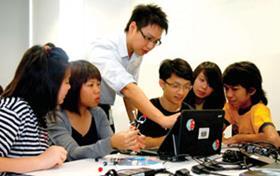
One unique feature about our PBL approach is that the problems have been designed so that students spend one day only working on them, individually as well as in teams, to propose a solution by the end of the day. This way they are constantly revisiting and refining their skills and they also receive daily feedback from us ('facilitators') which helps them improve their learning strategies.
On average, we will have 25 students working in teams of five, and one facilitator. Each student has his or her own personal laptop computer, which they use to access an online learning environment where they will find daily problem statements, worksheets and resources. Students can also make use of the Internet as part of their individual study.
Each day is divided into three sessions ('meetings') run by a facilitator. There are also two study periods in between for students to work individually or in their teams. An example of one of the problems we use is Fizzing bubbles, Box 1.
First meeting - problem analysis
The problem is introduced to students during the 'first meeting', which we refer to as the problem analysis phase. Students are then given about 10 minutes to discuss their initial response to the problem by working together to fill in a 'problem definition template' (PDT). In this process they identify what they know, do not know and need to find out to address the problem.
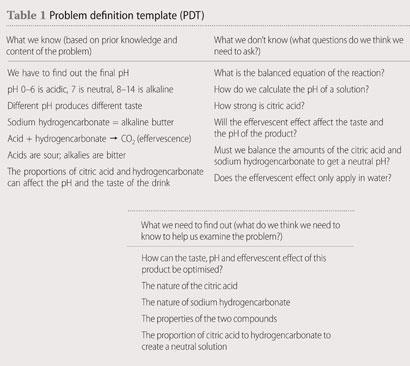
Our problems are designed in such a way that students will recognise familiar elements in their daily life and therefore be able to get involved in discussions immediately. We also purposefully avoid complicated technical words in the problem statement.
The opportunity for students to share ideas in a small group is believed to activate their prior knowledge and allows them to relate new information in the problem to their existing knowledge. Hearing what other students have to say can also uncover prior knowledge which they didn't realise they had.9
After the team discussion, the facilitator encourages all teams to share their ideas at the class level.10 At this point the facilitator suggests questions that the students should be asking, thus providing them with a good model for developing their thinking strategies.11
The discussions help students to realise the gaps in their existing knowledge and what they are required to know to deal with the problem. Thus by the end of the first meeting, students would have identified these gaps as areas for further study.
In addition, for the problem in Box 1, the facilitators would demonstrate the reaction between citric acid and sodium hydrogencarbonate, allowing students to observe the effervescent effect. Students would then experiment to see what happens if more citric acid was added after the initial reaction, and vice versa. Through this, the facilitator prompts the students to think about issues such as the amounts of materials required for the reaction (mole concept), and the amounts of materials available for reaction (limiting reagent).
The learning objectives of the problem in Box 1 include: understanding what chemical equations are and the importance of balancing them, as well as identifying limiting and excess reagents in a chemical reaction. Students are also expected to appreciate the significance of the mole concept and stoichiometry in the process of working out the chemical calculations. They should also learn about the reactions of acids, and the concept of pH. Note that the learning issues identified by students match to some extent the intended learning objectives of the problem (Table 1). The PDT is considered a work in progress, and students would continue to refine and add to it as they progressed in their learning throughout the day.
Study period 1: self-directed learning phase
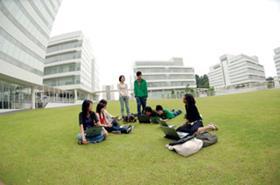
After the first meeting, students are given about an hour to work on their own and in their teams. Besides the problem statement, we usually also include a worksheet, which students are encouraged to answer during the first study period. The worksheet introduces various key scientific concepts and vocabularies that they may need to understand while working on the problem.
In Fizzing bubbles, the worksheet guides the students to understand the need for balancing chemical equations, mole concept and mole calculations. We do this because a significant proportion of our students do not have prior knowledge in chemistry.
The worksheet breaks the problem down into smaller tasks or steps, thus helping students to think through the problem systematically. It usually ends by leading the students back to the problem statement, where they are challenged to make use of their newly acquired knowledge and understanding to respond to the problem.
By the end of the first study period, each team would be expected to have answered at least in part, some of the questions they had raised in their PDT earlier. They may also refine and update their original ideas and questions as a result of their study.
Second meeting
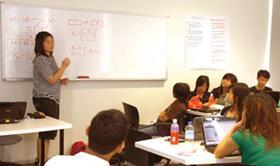
During the second meeting the various teams of students share their progress and understanding of the problem. The facilitator can help them at this stage with any learning difficulties and conceptual understanding.
For example, students could have come across the mole concept and stoichiometric calculations from the worksheet and other resources gathered in the first study period, and would like to use mole calculations to respond to the problem. However, they could be facing some problems in the calculations.
By being aware of the students' approach in handling the problem at this instance, the facilitator can then work together with them to overcome their learning obstacles.
Study period 2: self-directed learning phase
After discussion with the facilitator, the teams continue their self-directed study as well as team discussion to consolidate their findings and formulate a response to the problem. Since the third meeting will require a team presentation of their response to the problem, some time is also spent preparing a PowerPoint presentation, and rehearsing what will be presented.
Third meeting - reporting back
During the third meeting (reporting phase), each team presents its consolidated findings and response to the problem, defending and answering questions raised by peers and the facilitator. This process of critical questioning and explaining one's ideas is an essential component of a student's learning. At this point the facilitator would also clarify key ideas, if necessary. After all five teams have presented their solution to the problem, the facilitator also goes through a brief presentation that provides a possible response to the problem.
At the end of each day, students are asked to reflect on their learning process in a journal. This helps them develop an awareness of their learning process, identify their learning difficulties as well as consider ways in which they can improve.
Assessment
We assess our students on a daily basis. The students receive a grade each day, which is based on their class participation, teamwork, presentation skills, understanding of concepts evaluated by their ability to identify relevant questions, issues and to defend their presentations, as well as what they write in their journals. This is in-line with our educational philosophy which places more emphasis on the process of learning rather than content knowledge.
In addition, we run summative assessments administered over each semester, which are designed to evaluate students' understanding and application of concepts, rather than their recall of content knowledge. The daily grades and the results from these tests carry similar weightings to the student's final grade for the module because we consider the learning process to be equally important as the understanding and application of concepts in assessing the student's performance.
Student feedback
From their reflections (Box 2) we find that while students do face learning challenges initially, they do learn to overcome them in the course of the module. We also note that, in general, the problem statements do trigger their interest to find out more about the various concepts. They also appreciate the importance of teamwork and collaboration in their learning process.
Finally
Through the process of teamwork and individual study triggered by a problem, students develop an understanding of chemistry concepts as well as learn valuable life skills required in their future work and for further education. While the scope of this article did not allow us to share more about the challenges we face in implementing the PBL approach, some of these include the design of good problem triggers as well as the training and development of teachers in their roles as facilitators.
Elaine H. J. Yew is senior manager (faculty development) in the school of applied science at the Republic Polytechnic, Singapore. Eric K. H. Kwek is head of curriculum services in the same department.
Box 1- Fizzing bubbles
A fruit salt is being developed for use to relieve stomach upsets and feelings of bloatedness caused by too much food. When a spoonful of the fruit salt is added to a glass of water, it produces a fizzing, bubbling effect, similar to what is observed when pouring out a can of soft drink into an empty glass.

The active ingredients used in this product are citric acid and sodium hydrogencarbonate (sodium bicarbonate). Citric acid is found in citrus fruits, such as oranges and lemons, while sodium hydrogencarbonate, also known as 'baking powder', is what is used to make dough 'rise' when cakes are baked.
The amounts and proportion of citric acid and sodium hydrogencarbonate used in such products have to be optimised to ensure a pleasant taste and gentle bubbling effects. The Table indicates the bubbling effect and taste for different compositions of the two ingredients.
Box 2 - Examples of student feedback
Nur, age 19, wrote:
At the beginning of the lesson, I felt quite lost. This is because I work at a slower pace and need more time to understand things. I did not learn chemistry at secondary school and felt quite confused by some of the terms mentioned by my classmates. I had to do my own research to find out what the terms meant.
Nevertheless, I am glad that I managed to understand at least some of the concepts from today's lesson. I believe it is alright to learn at a slower pace as long as I understand at the end of the day.
Wong, age 18, wrote:
I shared with my teammates what I knew about the topic and I volunteered to write the chemical equation and to explain it to them later. When I did this, I found out that the concepts on limiting reagents and reagents in excess were needed to answer the problem today. However, I was not really sure whether the mole calculations were relevant to our team presentation because there wasn't much about this in the problem. However, my teammates explained that they are required for the later parts of the problem to ensure the appropriate amounts of substances are used and produced. All in all, I think with my own ideas alone I would not have been able to complete what my team has completed today. However, I think I did put my ideas across to the team for the presentation, but there is always room for improvement.
References
- J. S. Brown, A. Collins and P. Duguid, Educ. Researcher, 1989, 18, 32.
- E. L. Pizzini, D. P. Shepardson and S. K. Abell, J. Res. Sci. Teach., 1991, 28, 111.
- S. Papert in Constructionism: research reports and essays, 1985-1990, I. Harel and S. Papert (eds), Pp 1-11. Norwood, NJ: Ablex, 1991.
- H. S. Barrows, The tutorial process. Springfield Illinois: Southern Illinois University School of Medicine, 1988.
- S. T. Belt et al, Uni. Chem. Educ., 2002, 6, 65.
- S. T. Belt et al, Chem. Educ. Res. Pract., 2005, 6, 166.
- P. Ram, J. Chem. Educ., 1999, 76, 1122.
- W. A. M. Alwis in a keynote paper, International Symposium on PBL: Reinventing PBL Singapore, 2007.
- W. S. De Grave, H. P. A. Boshuizen and H. G. Schmidt, Instruct. Sci., 1996, 24, 321.
- C. E. Hmelo-Silver and H. S. Barrows, The Interdisc. J. Problem-based Learn., 2006,1, 21.
- A. Collins, J. S. Brown and S. E. Newman in Knowing, learning and instruction: essays in honour of Robert Glaser, L. B. Resnick (ed). Hillsdale NJ: Lawrence Erlbaum, 1989.






No comments yet